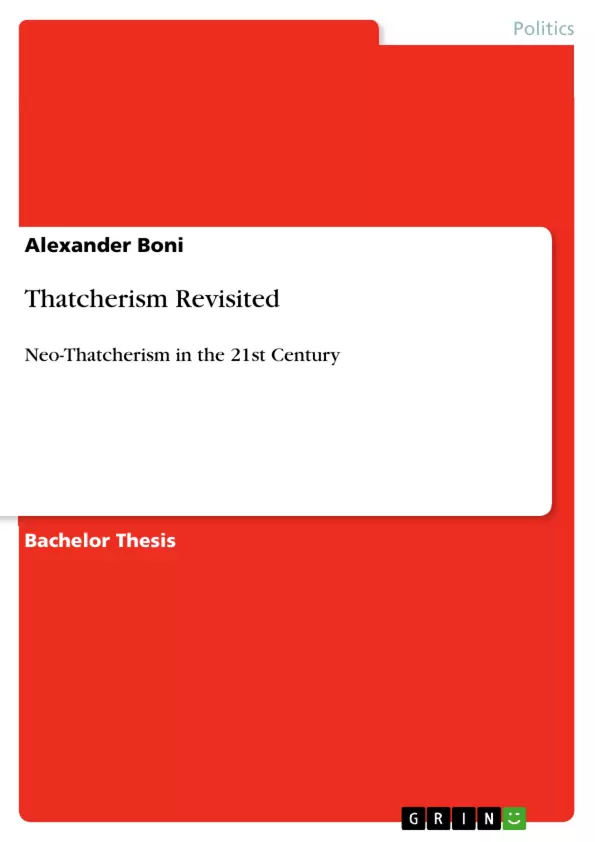Thatcherism continues to be one of the most contentious approaches in British politics today, just as its figurehead continues to be one of the most divisive figures in British political history. Despite its regard with both shame and pride within the Conservative party, it remains an influential approach to polity today, affecting every government that has followed Mrs Thatcher’s.
The philosophy that Thatcher and her closest allies embodied and brought to life between 1979 and 1990 is being exhumed for its values of a smaller state and a stronger, more independent economy following a ruinous financial crisis and critical public examination of national finances. The Keynesian renaissance that took hold at the height of the financial crisis has lost grip and ground to a resurgence in what is essentially a Thatcherite consensus.
This dissertation will first explore the key philosophical points of Thatcherism, exemplified during her time in office as Prime Minister. Secondly, it will examine the legacy of Thatcher and how Thatcherism has been an undeniable influence on politics since 1990. Finally, it will examine whether a return to stronger Thatcherite influences on public policy are desirable in light of an on-going economic crisis of British public finances. Britain’s national debt is now over £4 trillion – a staggering amount – with budget deficits of up to £150 billion each year adding to this crippling economic burden. As the economic affairs of Britain and the dire state of public finances are enduring topics of debate in both political and economic circles, the Thatcherite ideals of a small but powerful central government, reducing the prevalence of ‘welfarism’ and increasing the role that the private sector plays in the economy are of great relevance.
Ultimately, Thatcher’s legacy is undeniable and has watermarked many areas of public policy in governments that have followed her resignation as Prime Minister in 1990. It is the goal of this dissertation to examine and explore the newfound relevance of Thatcherism as not only a political philosophy, but also as a methodology with which to approach policy making in Britain. Calls for a fundamental rethink in the way that the British economy and the government as a whole is operated are becoming more prominent in many circles and it is likely that looking to the lessons of the past is just as, if not more, prudent than trying to reinvent the wheel of public policy.
Inhaltsverzeichnis (Table of Contents)
- Introduction
- Thatcherism Revisited
- 1979-1990: The Thatcher Years
- The Economics of Thatcherism
- The Social Impact of Thatcherism
- Summary
- 1997-2007: The New Labour Years
- The Thatcherite Legacy & Blatcherism
- Breaking Away from Thatcherism
- Summary
- 2008-2011: The Political Economies of Crisis
- The Keynesian Renaissance
- The Neo-Thatcherite Movement
- Summary
- 1979-1990: The Thatcher Years
Zielsetzung und Themenschwerpunkte (Objectives and Key Themes)
This dissertation will explore the core tenets of Thatcherism, its lasting influence on British politics since the 1990s, and its potential resurgence as a response to the ongoing economic crisis. The key themes explored include:- The economic and social impacts of Thatcherism during the 1980s
- The legacy of Thatcherism and its influence on subsequent governments
- The re-emergence of Thatcherite ideas in response to the 2008 financial crisis and its aftermath
- The debate surrounding the effectiveness and desirability of Thatcherism in addressing current economic challenges
Zusammenfassung der Kapitel (Chapter Summaries)
- Introduction: The dissertation provides an overview of the economic and social challenges faced by Britain in the 1970s, highlighting the period's economic instability and the rise of industrial unrest. It sets the stage for the discussion of Thatcherism as a response to these problems.
- 1979-1990: The Thatcher Years: This chapter examines the core principles of Thatcherism, including its economic policies of deregulation, privatization, and fiscal restraint. It also explores the social impact of Thatcherism, including its effects on labor unions, social welfare, and public services.
- 1997-2007: The New Labour Years: This chapter analyzes the extent to which the New Labour government under Tony Blair embraced or departed from Thatcherite principles. It explores the concept of "Blatcherism" and the ongoing influence of Thatcherism on British politics despite Labour's electoral victory.
- 2008-2011: The Political Economies of Crisis: This chapter delves into the re-emergence of Thatcherite ideas in response to the 2008 financial crisis. It examines the debate between Keynesian and neo-Thatcherite approaches to economic recovery, and the implications of these contrasting views for public policy.
Schlüsselwörter (Keywords)
The dissertation examines Thatcherism's impact on British politics, economics, and society. Key topics include: economic policy, privatization, deregulation, social welfare, labor unions, financial crisis, Keynesianism, neo-liberalism, and public policy.Frequently Asked Questions
What are the core philosophical points of Thatcherism?
Thatcherism emphasizes a smaller state, fiscal restraint, deregulation, privatization of state-owned industries, and reducing the power of labor unions.
How did Thatcherism impact British society in the 1980s?
It led to significant social shifts, including a reduction in "welfarism," increased roles for the private sector, and a stronger focus on individual economic independence, though it remained highly divisive.
What is "Blatcherism"?
"Blatcherism" refers to the perceived continuation of many Thatcherite economic policies by Tony Blair’s New Labour government between 1997 and 2007.
Why has there been a resurgence of Thatcherite ideas recently?
Following the 2008 financial crisis and rising national debt, ideals of small government and fiscal discipline have regained relevance in public policy debates.
What is the Keynesian renaissance mentioned in the dissertation?
It refers to the temporary return to government-led economic stimulus during the height of the 2008 financial crisis before the shift back toward neo-Thatcherite austerity measures.
- Citation du texte
- Alexander Boni (Auteur), 2011, Thatcherism Revisited, Munich, GRIN Verlag, https://www.grin.com/document/171291



